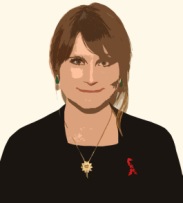We must be ambitious in our action on HIV during the COVID-19 crisis

By Kat Smithson, Director of Policy
Beyond the number of people dying, COVID-19 compounds inequalities that lead to poorer health outcomes more widely. This week saw the publication of a PHE review that describes a disproportionate impact of COVID-19 on BAME people in England and links this impact to wider socio-economic and health inequalities. But what are the recommendations for action to address these inequalities? HIV is one such health issue driven by inequality. We are living in a time where those inequalities are deepening.
Continued action and leadership on HIV is therefore vital with the urgent need to mitigate the harms of this crisis and set ambitions on HIV throughout it.
This pandemic is having a huge impact on all areas of life, including our sex lives. With these changes, the need for sexual health and HIV services is still there, it’s just changed in shape.
For some the impact of lockdown on their wellbeing may have exacerbated risk behaviours and increased vulnerabilities to HIV. COVID-19 has also removed the availability of options that people have to protect and reduce harm to themselves. In order to avoid destitution some sex workers are, for example, reporting increased higher risk activity such as chemsex-based sex work.
Migrants, homeless populations, people who inject drugs and sex workers, are just some of those more likely to experience food and housing insecurity and barriers to (increasingly important) digital access at this time. Such factors have direct and indirect consequences for HIV risk.
Despite these concerns, sexual health services have noted a sharp decrease in attendance amongst sex workers, victims of sexual and domestic violence and under 18s. Among the reasons for this is that COVID-19 is compounding the harmful alignment of sex with shame in new ways that are presenting barriers to access. We know people have been dissuaded from attending services for PEP due to worries about being judged for sexual activity during the lockdown period.
The need for safe, discreet and accessible services that are free from judgement is as high as ever.
Action is not only needed to meet need amongst those having sex. About 4 in ten Londoners told the GMI Partnership sex during COVID survey that they weren’t having sex (survey period 6 April – 3 May 2020) and some HIV transmissions will have been prevented in this time. For this to have a lasting impact on the epidemic trajectory, those who may have acquired HIV recently must have access to testing now to reduce possibility of onward transmission before diagnosis. 56 Dean St refers to this as ‘breaking the chain’ for their #TimeToTest campaign. As lockdown eases this window of opportunity is fast diminishing.
It is also unconscionable to hold off efforts to diagnose the more than 7,000 people living with undiagnosed HIV in the UK, not least because of the known harm of late diagnosis and the enhanced risk associated with COVID-19 for those with untreated HIV. Diagnosis and linkage to care, involving voluntary and peer led services, must adapt to the time to ensure that those who are diagnosed are safely supported.
Clinical advice on provision of services through the crisis has so far been met locally by varied interpretations. While some areas are actively promoting testing, other areas have put the brakes on. We know of confusion around the ethics and practicalities of service provision. Questions around lab capacity for testing and concerns about taking resource away from the COVID-19 effort have gone unanswered by PHE in a format that can be shared widely across the system. More pressing should be the serious ethical and human rights implications of inaction, especially as we move forward into a more sustained period of new normal. There needs to be a clear message from the top that HIV outcomes remain important and that we should still be endeavouring to achieve open and universal access to the services that achieve them, even if that access looks different.
The notion of protecting our NHS has been a powerful driver for personal and socially responsible action in recent months. But our concept of what this means should go well beyond the familiar images of the NHS ‘frontline’ to consider a broader concept of a system grappling with COVID-19 and continued demand for other services. The impact of this pandemic on our day to day lives is here to stay.


